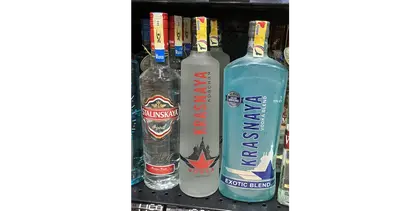As one strolls around various countries in Latin America, an underlying appreciation for Russia – specifically Soviet Russia – can still be sensed.
Years after communism fell in Europe, Quito, the capital of Ecuador, still has a centrally located street named ” Checoslovaquia ” and a primary school named “Escuela Unión Soviética,” the logo of which is the Ecuadorian flag crossed against a Soviet flag.
JOIN US ON TELEGRAM
Follow our coverage of the war on the @Kyivpost_official.
A trip to the grocery store will likely have locally-produced vodkas with Russian names, such as “Stalin’s vodka” or “Red vodka,” with a label emblazoned with the Red Star of the Soviet Union and St Basil’s Cathedral on Red Square superimposed across it.
It’s easy to find the tint of a general positivity towards Moscow here, like few other places in the world.
The president of Ecuador until last year, was named Lenin Moreno. He was not alone with the seemingly unusual first name. In the decades from 2000 to 2020, there were 8,716 boys named Lenin and 7,745 named Stalin. Other typically Russian names, like Vladimir, Ivan, or Yuri, are common.
However, should one expect a Lenin to be born, and a daughter arrives instead, hundreds of girls are named Krupskaya (often misspelled in people’s birth certificates as Kruskaya), for the wife of Vladimir Lenin, Nadezhda Krupskaya.
The predecessor to the Ecuadorian Lenin, Rafael Correa, who after a decade in office left with public approval north of 70 percent, got a job at the Russian television network Russia Today (RT). Even though he’s a graduate of U.S. universities for his master’s degree and Ph.D., he did not view RT to be propaganda – just an international news channel.
In the context of Latin America, RT is considered similar to Al Jazeera, CNN International, or other major international network. The flashy colors, beautiful sets, and expensively produced programming favorably impress a population where the quality of television programming is notoriously low quality.
So it’s not entirely surprising that last month Guatemala’s President Alejandro Giammattei was the first Latin American president to visit Ukraine in 12 years.
Prior to the war, several hundred Ecuadorian students who appreciated a higher education were hosted in Ukraine. Likewise, Russia hosts hundreds of Ecuadorian students, with a particular grouping in Belgorod, less than 42 kilometers from the Ukrainian border.
Given this general positivity towards Russia, and openness to propaganda sources such as Russia Today, it’s probably not surprising that Latin America hasn’t been particularly supportive of Ukraine or hasn’t opposed Russia. In fact, active support for sanctions is almost invisible.
Despite the fact that citizens of many Latin American countries, including Colombia, Mexico, and Brazil have died fighting on the side of Ukraine during the war, the rest of their continental neighbors remained largely unmoved by what is happening.
As long as the West, and Ukraine, do not enter the media arena and compete for locals’ hearts and minds, a general warmness for Russia will likely continue to remain.
You can also highlight the text and press Ctrl + Enter



